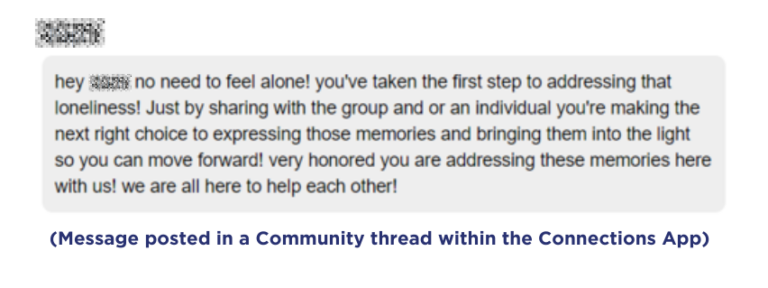
Loneliness, a widespread phenomenon permeating modern society, has emerged as an epidemic with far-reaching consequences. This pervasive condition affects a substantial population segment, presenting a growing concern in our modern world. It goes beyond the mere absence of social contact, constituting a deeply subjective perception of being alone, feeling disconnected, and lacking meaningful relationships or connections with others. Most importantly, isolation transcends age, background, and demographics, though certain groups like those lacking social support networks might be particularly vulnerable.
Loneliness and substance use disorder (SUD)
Loneliness and substance use disorder (SUD) are intricately linked, with one often exacerbating the other in a vicious cycle. Isolation can be both a precursor and a consequence of SUD, contributing to its development and perpetuation.
Without social connections and support, individuals may turn to drugs or alcohol to self-medicate or cope with their emotional distress. The temporary relief provided by substances can give a false sense of companionship and fill the void created by seclusion. However, this reliance on substances as a coping mechanism often leads to a cycle of addiction, further isolating individuals and deepening their struggles.
On the other hand, SUD can intensify feelings of isolation by damaging social relationships and isolating individuals from their support networks. It leads to strained relationships, loss of trust, and increased conflict, causing individuals to withdraw from social interactions. As a result, they may experience heightened feelings of alienation, compounding their reliance on substances as a source of comfort. In a recent study, 79% of the participants accessing treatment for substance use reported often feeling lonely. Additionally, 69% of the participants agreed with the statement “loneliness has been a serious problem for me”.
Furthermore, societal stigmatization and judgment surrounding substance use can worsen the solitude experienced by individuals with SUD. The fear of being rejected or judged by others can deter individuals from seeking help or reaching out for support, further isolating them in their struggle.
The Cycle of Loneliness
In this vicious cycle of loneliness and SUD, isolation negatively impacts substance use while, at the same time, substance use heightens feelings of isolation.
As individuals with SUD become increasingly estranged from their social support networks, they may feel stuck in a state of loneliness. Conversely, isolation can contribute to a relapse of SUD after long periods of abstinence or treatment engagement as it triggers heightened cravings for drugs or alcohol to alleviate emotional discomfort.
How do We Support Loneliness in Recovery?
1. Through Social Connections
Social media platforms have proven beneficial for socially isolated individuals as mental health experts play a vital role in supporting and protecting vulnerable individuals through these mediums. A great example is the Connections app.
CHESS Health offers the Connections app, a comprehensive solution that meets individuals with Substance Use Disorder (SUD) where they are. This app provides moderated peer support and on-demand cognitive behavioral therapy (CBT) programs available 24/7. Clinical studies have shown remarkable results, with 85% of patients using the Connections app reporting improved treatment outcomes.
The app correlated with a:
• 40 to 50% reduction in key relapse risk factors.
• 20% increase in treatment duration.
• 30 to 40% decrease in dropout rates from intensive outpatient programs.
• 30 to 50% higher abstinence rate compared to the control group.
By leveraging social connections through technology and specialized applications, individuals in recovery can access continuous support, peer interaction, and evidence-based therapy.
2. Through Community Engagement
By engaging with like-minded individuals who understand their struggles, those in recovery can build a support network and find acceptance without judgment. Communities prioritizing destigmatization and support for individuals with substance use disorders create safe spaces to provide therapy, counseling, and peer support. These peer-led groups help individuals recognize the external influences on their behavior and gain skills to cope with challenges they may encounter throughout healing.
3. Through Fostering Supportive Environments where Individuals can Connect with Others
These environments offer a sense of inclusion, understanding, and shared experiences, promoting a sense of togetherness and reducing feelings of solitude.
One effective approach is to establish community support. These support groups can be facilitated by trained professionals or led by individuals with lived experience, offering a safe space where individuals can freely express themselves without fear of judgment.
For example, because discussions are anonymous and moderated, the community within the Connections app becomes a supportive, affirming environment for individuals to share their experiences and support each other. CHESS Health’s solutions are based on peer-reviewed research and demonstrate the lasting effect of “connectedness” on long-term recovery from SUD by reducing feelings of isolation that can lead to relapse.
Moreover, educating and involving families in understanding addiction, offering family therapy sessions, and encouraging open communication can help repair strained relationships and provide a support network beyond formal treatment settings.
4. Through Cultivating Meaningful Relationships and Nurturing Human Connections
One effective way to achieve this is by encouraging the formation of genuine relationships within recovery communities. By emphasizing the importance of building authentic connections, individuals can find solace in knowing they are not alone in their struggles. This task can be achieved through organized social events, support for specialized communities, group activities, and regular gatherings that facilitate interaction and create opportunities for individuals to bond over shared experiences.
In addition, promoting empathy and understanding among peers is vital in nurturing human connections. By fostering an atmosphere of compassion and non-judgment, individuals in recovery can feel safe to express themselves openly and honestly.
The Bottom Line
Addressing the epidemic of being alone and its connection to substance use disorder treatment and recovery requires a multi-faceted approach. By leveraging social connections, technology, and specialized applications, individuals in recovery can access continuous support and evidence-based therapy. These strategies can help break the isolation and substance abuse cycle, promoting healing, well-being, and lasting recovery. Contact us today for more information on how we can help support those in recovery from SUD, 24 hours a day, 7 days a week.

Resources
- https://www.hhs.gov/sites/default/files/surgeon-general-social-connection-advisory.pdf. “Our Epidemic of Loneliness and Isolation.” U.S. Surgeon General, U.S. Department of Health and Human Services, 2023, https://www.hhs.gov/sites/default/files/surgeon-general-social-connection-advisory.pdf.
- https://www.ncbi.nlm.nih.gov/pmc/articles/PMC7483387/. “Battling the Modern Behavioral Epidemic of Loneliness: Suggestions for Research and Interventions.” National Library of Medicine, March 4, 2020,https://jamanetwork.com/journals/jamapsychiatry/article-abstract/2762469.
- https://www.ncbi.nlm.nih.gov/pmc/articles/PMC8504333/. “Loneliness and Social Isolation as Risk Factors: The Power of Social Connection in Prevention.” National Library of Medicine, May, 6, 2023, https://journals.sagepub.com/doi/10.1177/15598276211009454.
- https://www.ncbi.nlm.nih.gov/pmc/articles/PMC7483387/. “Battling the Modern Behavioral Epidemic of Loneliness: Suggestions for Research and Interventions.” National Library of Medicine, June, 1, 2020, https://jamanetwork.com/journals/jamapsychiatry/article-abstract/2762469.
- Substance Abuse and Mental Health Services Administration (SAMHSA). Community Engagement: An Essential Component of an Effective and Equitable Substance Use Prevention System. SAMHSA Publication No. PEP22-06-01-005. Rockville, MD: National Mental Health and Substance Use Policy Laboratory. Substance Abuse and Mental Health Services Administration, 2022.
- https://ro.uow.edu.au/cgi/viewcontent.cgi?article=5859&context=sspapers. “Loneliness among people with substance use problems: A narrative systemic review.” University of Wollongong, January 1, 2020, https://ro.uow.edu.au/cgi/viewcontent.cgi?article=5859&context=sspapers.
